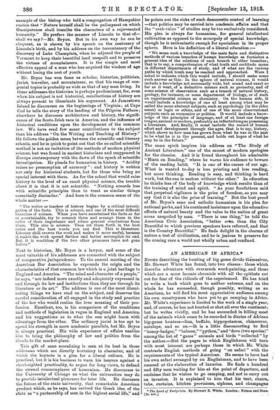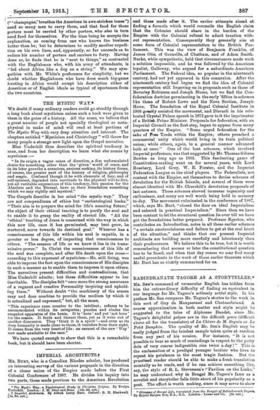AN AMERICAN IN AFRICA.*
BOOKS describing the hunting of big game divide themselves, Mr. Stewart White has found, into two classes : those which describe adventure with overmuch word-painting, and those which are a mere laconic chronicle with all the epithets cut out for fear of the ridicule of the experienced. He has tried to -write a book which goes to neither extreme, and on the whole he has succeeded, though possibly, writing as an American, he will find his most appreciative audience among his own countrymen who have yet to go camping in Africa. Mr. White's experience is limited to the work of a single year, and, of course, he has not hunted or shot all over the continent; but he writes vividly, and be has succeeded in killing most of the animals which come to be recorded in diaries of African big-game hunters—lion, buffalo, hippopotamus, rhinoceros, antelope, and so on.—It is a little disconcerting to find "honey-badger," "baboon," "python," and "dove (two species)" among the list of "game" animals and birds "collected" by the author.—But the pages to which Englishmen will turn with most interest are perhaps those in which Mr. White contrasts English methods of going "on safari" with the requirements of the typical American. He seems to have had his own safari arranged by an Englishman, and to have been amazed at the elaboration of luxuries. He finds a hundred and fifty men waiting for him at the point of departure, and exclaims that he wishes to go camping, and not to carry out an invasion. It is explained to him that his tent, chairs,. tubs, curtains, kitchen provisions, siphons, and champagne • The Land of Footprints. By Stewart E. White. London : Nelson and Sons. 125. net.] , (4" champagne,' breathes the American in awe-stricken tones ") geed so many men to carry them, and that food for these porters must be carried by other porters, who also in turn need food for themselves. For the time being he accepts the explanation, as coming from one who knows the business better than he; but he determines to modify another expedi- tion on his own lines, and, apparently, so far succeeds as to reduce his number of porters and carriers to forty. Having done so, he finds that he is "next to things," as contrasted with the Englishman who, with his army of attendants, is "led about Africa like a dog on a string." We may sym- pathize with Mr. White's preference for simplicity, but we doubt whether Englishmen who have done much big-game hunting in Africa would accept his description either of American or of English ideals as typical of sportsmen from the two countries.











































 Previous page
Previous page